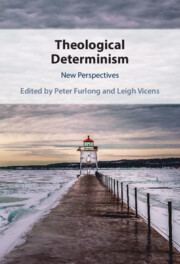Book contents
- Theological Determinism
- Theological Determinism
- Copyright page
- Contents
- Contributors
- Acknowledgments
- Introduction
- Chapter 1 Theological Determinism and Creation
- Chapter 2 Am I Here by Accident?
- Chapter 3 You Searched Me and Knew Me
- Chapter 4 Fatalism and Some Varieties of Contrastive Explanation
- Chapter 5 Divine Transcendence
- Chapter 6 The Incompatibility of Universal, Determinate Divine Action with Human Free Will
- Chapter 7 Natural Compatibilists Should Be Theological Compatibilists
- Chapter 8 An Argument for Theological Incompatibilism
- Chapter 9 Human Freedom and the Inevitability of Sin
- Chapter 10 Hard Theological Determinism and Divine Forgiveness Are Incompatible
- Chapter 11 Moral Luck, Free Will Theodicies, and Theological Determinism
- Chapter 12 Divine Determinism and Gratitude for Sins
- Chapter 13 The Problem of Trust
- Chapter 14 Toward a Reactive Attitudes Theodicy
- Chapter 15 Christ in Gethsemane
- Bibliography
- Index
Chapter 11 - Moral Luck, Free Will Theodicies, and Theological Determinism
Published online by Cambridge University Press: 30 September 2022
- Theological Determinism
- Theological Determinism
- Copyright page
- Contents
- Contributors
- Acknowledgments
- Introduction
- Chapter 1 Theological Determinism and Creation
- Chapter 2 Am I Here by Accident?
- Chapter 3 You Searched Me and Knew Me
- Chapter 4 Fatalism and Some Varieties of Contrastive Explanation
- Chapter 5 Divine Transcendence
- Chapter 6 The Incompatibility of Universal, Determinate Divine Action with Human Free Will
- Chapter 7 Natural Compatibilists Should Be Theological Compatibilists
- Chapter 8 An Argument for Theological Incompatibilism
- Chapter 9 Human Freedom and the Inevitability of Sin
- Chapter 10 Hard Theological Determinism and Divine Forgiveness Are Incompatible
- Chapter 11 Moral Luck, Free Will Theodicies, and Theological Determinism
- Chapter 12 Divine Determinism and Gratitude for Sins
- Chapter 13 The Problem of Trust
- Chapter 14 Toward a Reactive Attitudes Theodicy
- Chapter 15 Christ in Gethsemane
- Bibliography
- Index
Summary
I raise two challenges for theological determinism. First, a prominent criticism of theological determinism holds that human moral responsibility is incompatible with theological determinism. Many theological determinists resist this criticism by maintaining that determinism is compatible with moral responsibility. I attempt to break new ground in this debate by arguing that the theological determinist cannot adequately avoid moral luck. I argue that opponents of theological determinism can embrace a truly luck-free notion of responsibility, on which nothing beyond the agent’s control impacts their praiseworthiness or blameworthiness. But theological determinists, insofar as they are not skeptics about human responsibility, are stuck accepting that luck impacts responsibility. Thus theological determinists are committed to intuitive unfairness, which their opponents can avoid. Second, although I grant that some free will theodicies are available to theological determinists, I argue that they cannot make use of the most attractive type of free will theodicy. Finally, I draw an interesting connection between my approach to moral luck and my preferred sort of free will theodicy.
Keywords
- Type
- Chapter
- Information
- Theological DeterminismNew Perspectives, pp. 184 - 194Publisher: Cambridge University PressPrint publication year: 2022
- 1
- Cited by



